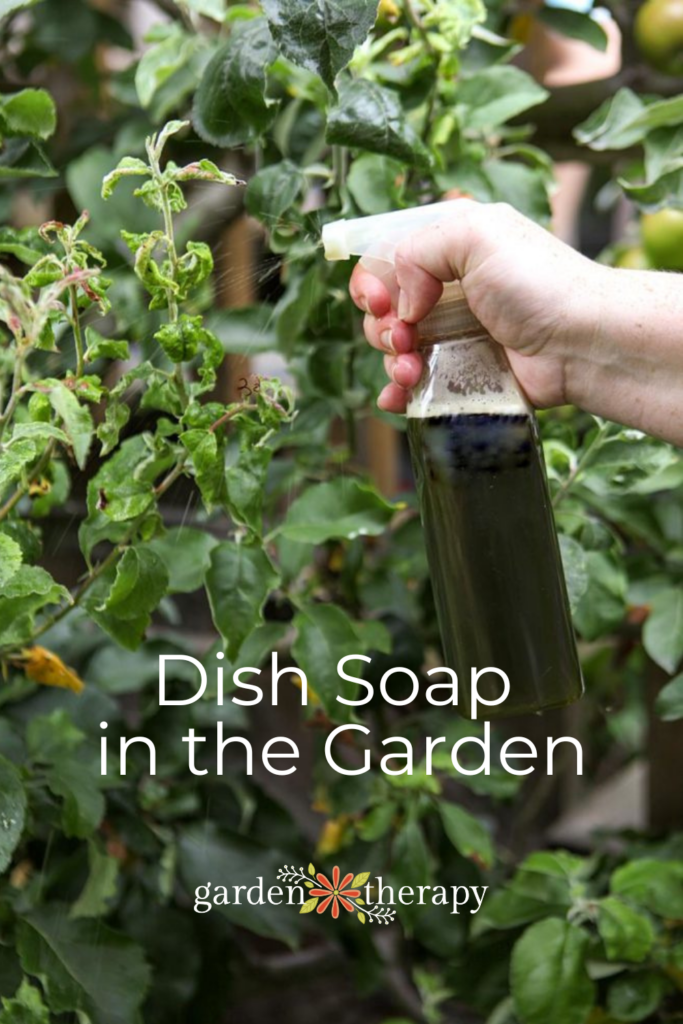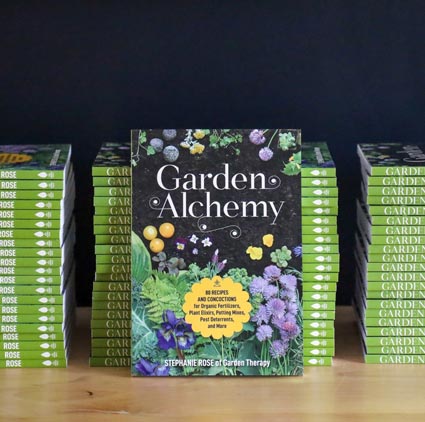Dish soap is one of those cheap, household ingredients that many gardeners claim have superpowers. But is that true? Can you use soapy water for plants? Does it actually kill aphids? Let’s get to the bottom of what dish soap is doing to your plants when you use it in your garden.
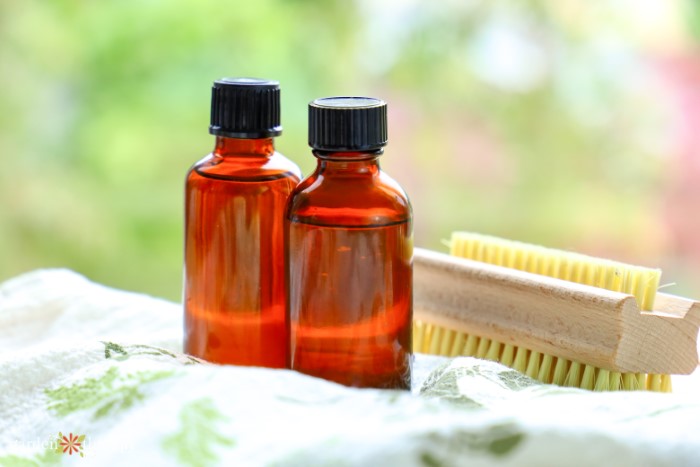
I love reading the comments on the blog and places like Facebook, where all of us gardeners are helping each other out. Whether trying to identify why their plant is dying, when to plant their seeds, or identifying a plant in their garden, everyone is quick to collaborate with virtual gardening friends.
In many of these comments, I have people sharing their gardening hacks, DIYs, and tricks they use to do everything from making their plants grow quicker to reusing household items.
One I see mentioned all the time is using dish soap on plants as a form of insecticide. It comes up so much that I thought it was about time I talked about it!
I use dish soap in my garden, but there’s a catch. It’s probably not the same kind of dish soap that you might feel inclined to use.
Let’s talk about the effects of soapy water on plants. Here’s what you’ll learn in this article:
- Make Sure You’re Using the Right Soap for Plants
- Castile Soap for Plants
- Will Dish Soap Kill Plants?
- Using Dish Soap as Insecticide
- Using Dish Soap for Fruit Flies
- Using Dish Soap and Vinegar in the Garden
- FAQs
- Other Common Household Ingredients to Consider
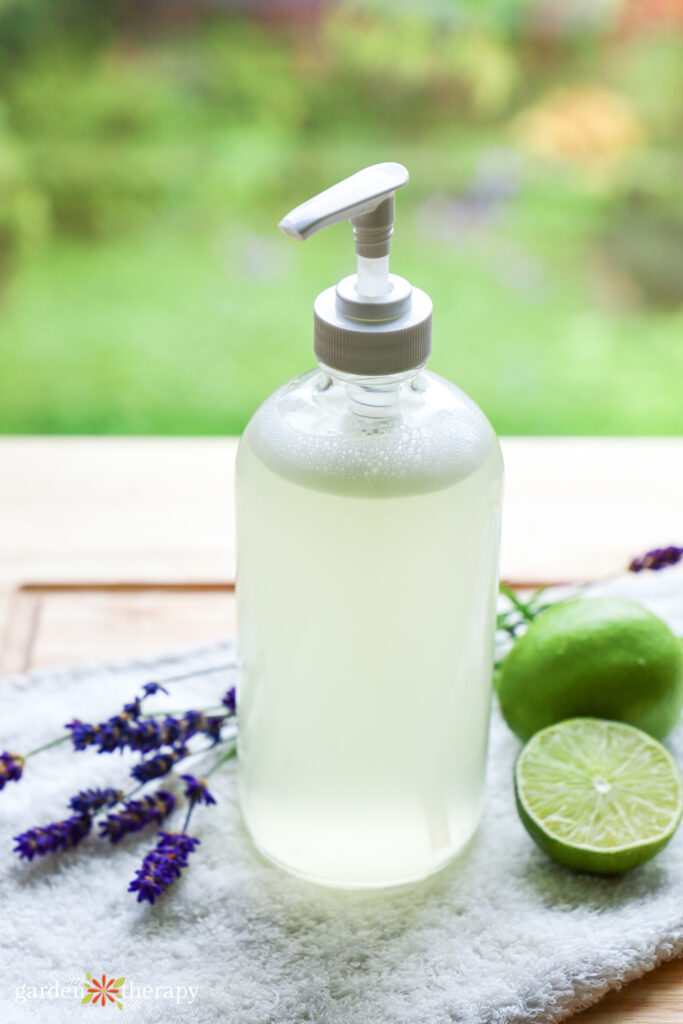
Make Sure You’re Using the Right Soap for Plants
I want to take a second to clarify what I mean by dish soap. Most big brands like Dawn, Palmolive, and Sunlight are commonly referred to as dish soap.
But they’re really a detergent. And the difference between soap and detergent is a pretty big one.
Soaps are made out of natural oils and fats, while detergents are made from synthetic chemicals called surfactants. Both are effective at cleaning grime and grease, but one is more natural than the other.
Popular dish detergents contain lots of surfactants, like sodium lauryl sulphate, which are laboratory-made foaming agents. They’re not great for the environment, as they take a very long time to biodegrade. They’re also difficult to filter through water, so they linger for a long time.
If you’re spraying dish detergent in your garden, it can linger in your soil long after the rain has washed it off your plants.
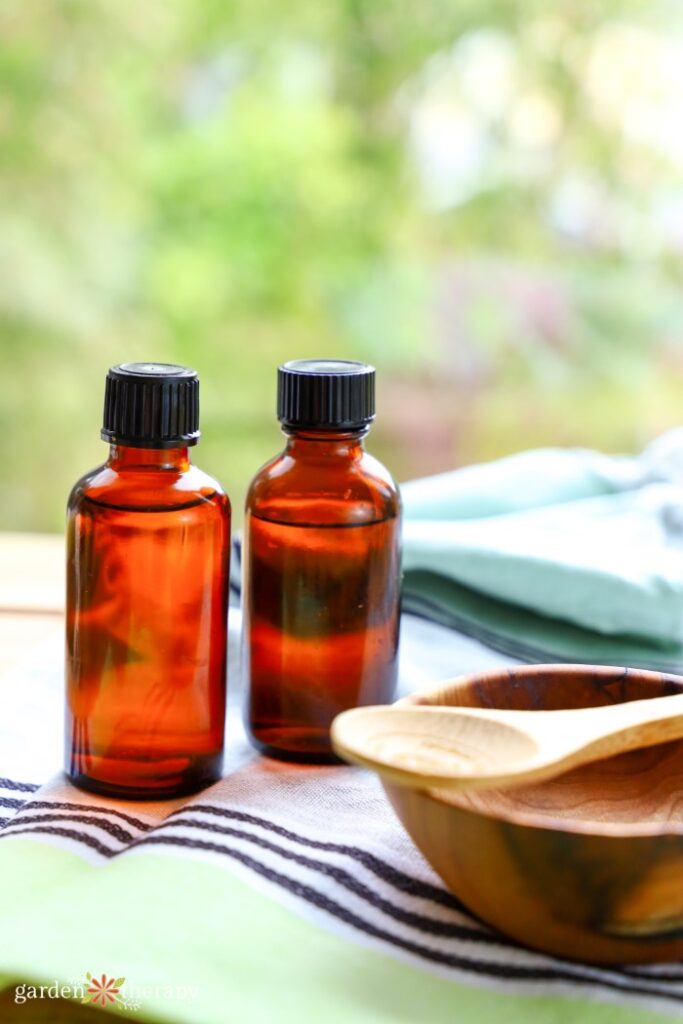
Castile Soap for Plants
So, what soap is safe for plants? I make my own biodegradable dish soap out of castile soap. This is a soap made from vegetable oils, traditionally from olive oil but now more commonly coconut or palm oil. It’s a potassium-based soap and completely natural as opposed to detergents. It’s a true soap, folks!
You’ve probably seen Dr. Bronner’s castile soap as it’s the one more easily available. You can use this in your garden, but it must be diluted. More on that below!
You also want to avoid using castile soap with fragrance or essential oils. You want pure, unscented castile soap only for your plants.
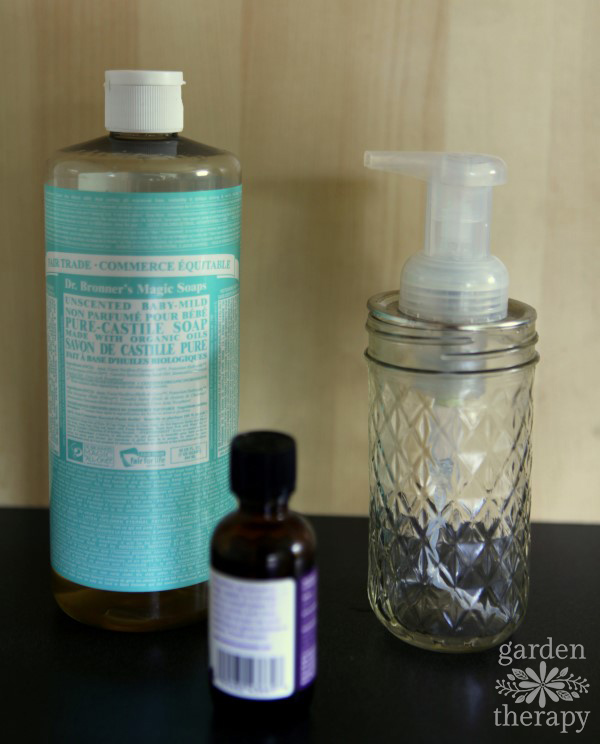
Will Dish Soap Kill Plants?
If we use dish soap to clean our dishes and then eat off of them, they must be safe for our plants. Right?
Dish detergents are known to remove plant’s natural waxes and oils that are used to protect the leaves. They’re a little too good at their job, potentially weakening the plants.
The effects of soapy water on plants aren’t a sure science, but high concentrations of soap can certainly burn foliage. Anyone using DIY methods using dish soap as an ingredient should exert caution.
Dish soap sprays for the garden should be highly diluted, consisting of only 2% dish soap. This means you’ll want only two teaspoons of dish soap per pint of water.
Some plants are highly sensitive to any amount of soap, like sweet peas or cherries. You should always test a small area before applying the soap spray all over the plant.
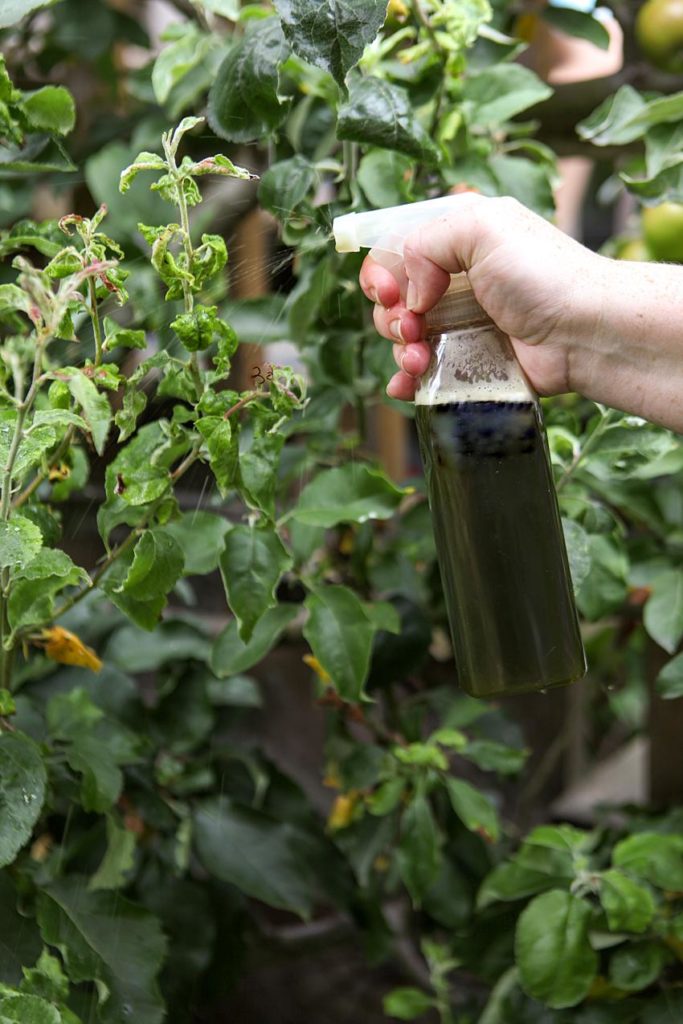
Using Dish Soap as Insecticide
The most popular reason to use soapy water for plants is an insecticide. While we’re not entirely sure how this works, the best guess is that it washes off some of the insect’s protective coating on their body, causing them to dry out.
Soapy water for aphids is one of the most common uses, but it also works on other soft-bodied insects like whiteflies, thrips, and mites. However, it doesn’t work on larger pests like caterpillars and beetles. But this also means it is safe for most pollinators and large insects!
I use dish soap (castile soap) in my pest deterrent spray. It makes the concoction stick to the insect or the animal, helping to keep them away from your plants.
True dish soap (castile soap) works best when you directly spray the insect. It won’t be as effective if you’re spraying the plant, and we want to avoid getting soap on the plant as much as possible not to damage it. Turn over the leaves and coat the insects only as best as you can.
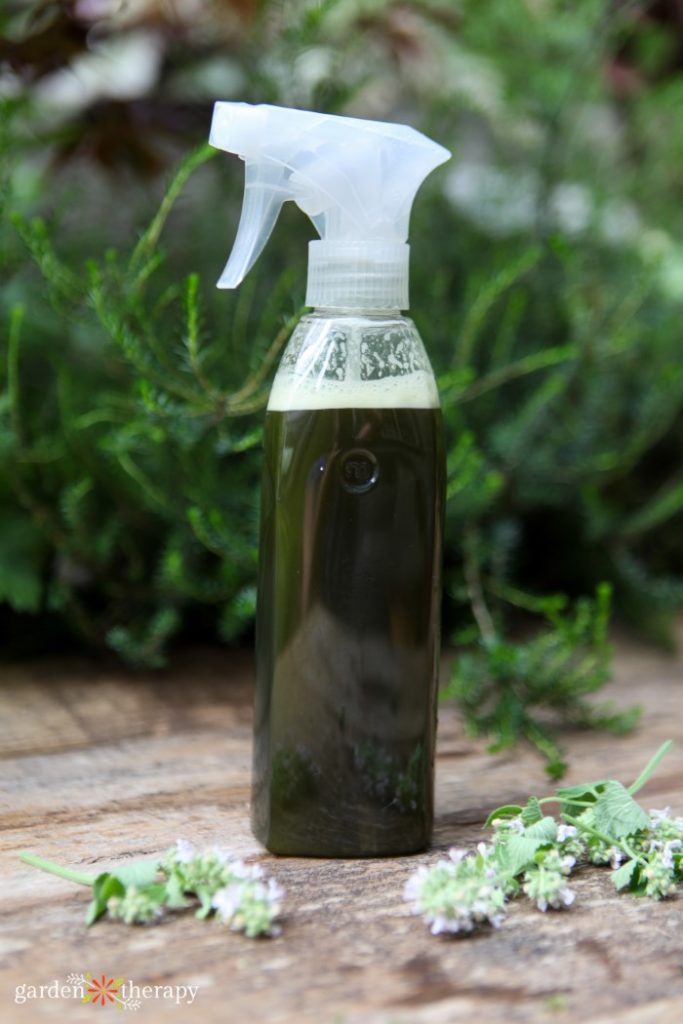
Using Dish Soap for Fruit Flies
Soap water works for more than just pests on plants but also for fruit flies.
A while ago, I did a little experiment at my house with the fruit fly trap. I first made it when I had a ton of fruit flies in the kitchen. I filled my trap (you can see how I did it in this fruit fly trap tutorial) with water and apple cider vinegar, but I didn’t put any soap in the mixture.
The fruit flies were able to fly right into the trap, but they weren’t dying. Instead, they were flying around within the trap until some of them eventually died.
But when I added a couple of drops of dish soap, the fruit flies fell down into the liquid as soon as they touched this.
Dish soap breaks the surface tension on the water, causing the insects to sink and drown. It makes the world of a difference when making a simple fruit fly trap at home.
Since this concoction isn’t going on your plants, feel free to use any dish soap or dish detergent.
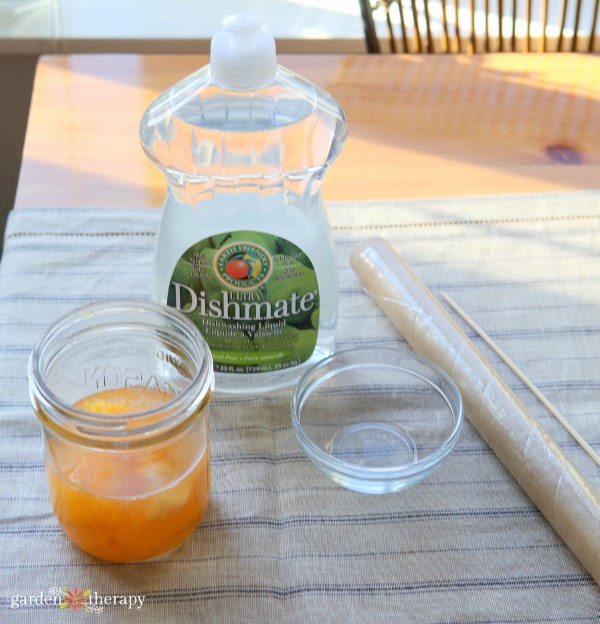
Using Dish Soap and Vinegar in the Garden
Another common DIY concoction is combining dish soap and vinegar, as well as salt, as a natural weed killer.
I already talked about this in-depth in my post about using vinegar in the garden, but I’ll mention it again here. This is not a good alternative to simply picking weeds.
Vinegar can be harmful to plants, soil, wildlife, and microorganisms. Yes, it can kill weeds, but it can also harm other things in your garden as well.
Dish soap and vinegar sprays also have a tendency only to kill the leaves, not the root. So, the plant will likely return after spraying it.
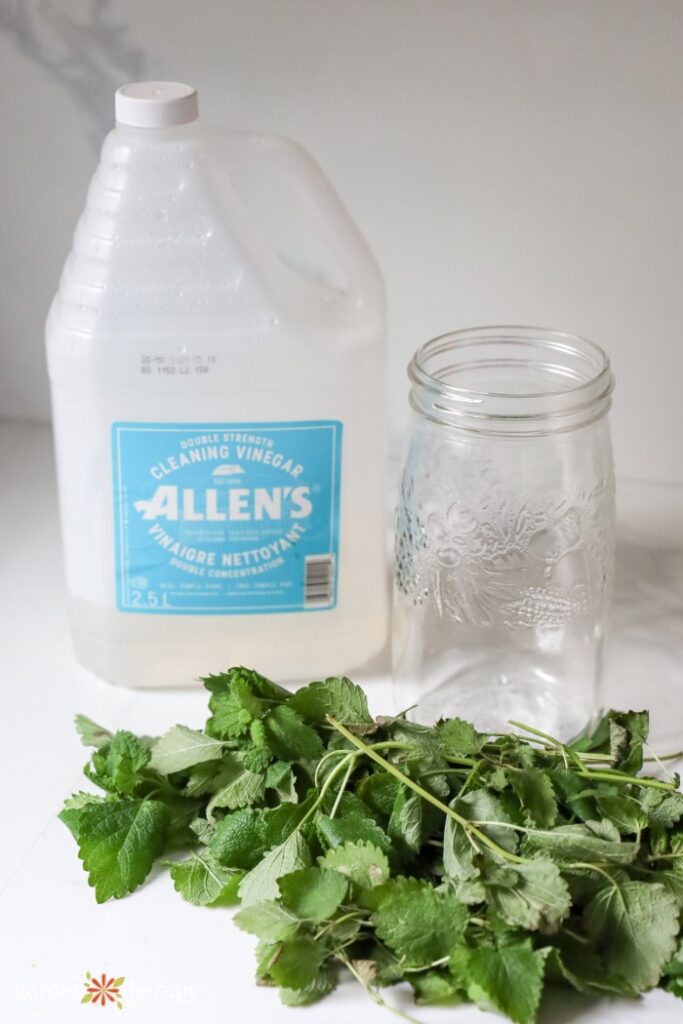
FAQs
Similar to how dish soap can strip essential oils coating plants, it can also damage grass if used in high concentrations. However, it’s not the most effective way to kill grass. It works best as an insecticide. If you have an infestation and want to use soapy water as a homemade insecticide, make sure you dilute the soap to about a 2% ratio with water.
If you properly dilute the dish soap, you do not need to rinse it off your plants. That being said, I highly recommend you test out a few leaves and watch for any adverse reactions before spraying the entire plant!
While I have not personally tried it, some people leave bars of scented soap in their yards to help repel unwanted pests. Just like dish soap, this can also be potentially damaging to plants. Instead, I suggest you try hanging bars of soap in your garden to repel plant-hungry animals like rabbits and deer. This homemade Irish Spring soap should do the trick nicely!
So that’s how I use dish soap and soapy water for plants! Or, more accurately, very small, measured, and diluted concentrations of castile soap. Let me know if you have any more questions in the comments below.

